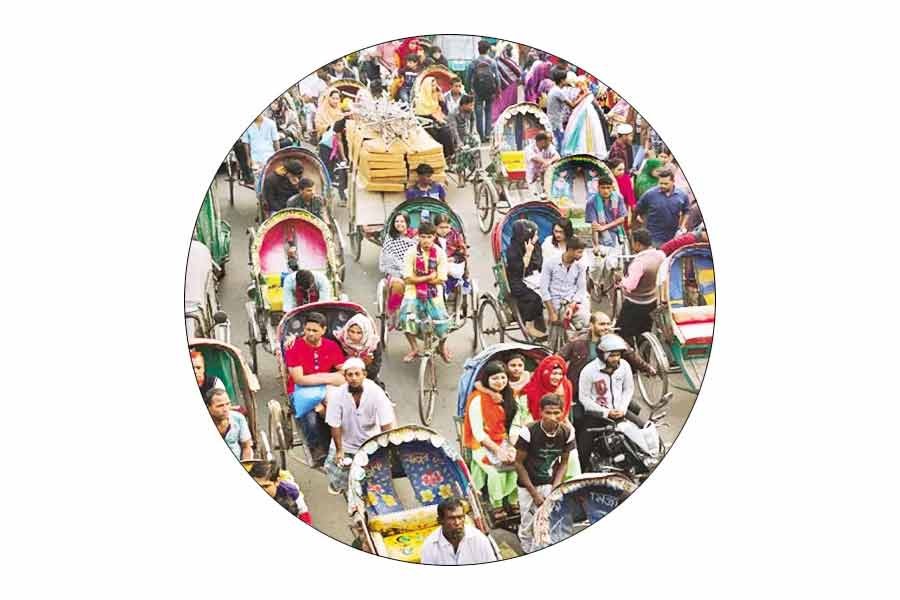Passing through all socio-economic deadlocks by the urban middle and lower-middle classes has been the norm in this country for long. Presently discovering themselves in the midst of a global whirlwind filled with scores of uncertainties, these two classes have started bracing for another blow to their peaceful survival. In the Third World countries, the middle class in the broader sense is considered a class with scores of vulnerabilities. This situation was viewed as a post-WW-II reality. Unlike seen in the other countries, the middle and lower-middle classes comprise a remarkably large segment in the Bangladesh cities, especially Dhaka. These families are normally educated, many having members with the Bachelors' degree. Moreover, many school and college-going students belong to these classes. Except a handful, they reside in their rented houses.
A common problem distinguishing their lives is the non-compromising upholding of their feeling of self-esteem. Even in their hardest of times, they wouldn't give in to the stark reality. In the times of off-and-on pandemic flare-up, and the simmering Russia-Ukraine War being made worse by the worldwide economic turbulence, they still try, desperately at that, to stay afloat. That, too, with dignity. Nobody knows how long they will be able to hold on. But the urban middle class is not going to give up on their efforts to survive without becoming subjects of pity.
Following the stringent government directive to go by the ongoing stringent electricity rationing, many of them now throng the shops of rechargeable electrical gadgets. Lots of them cannot afford to buy the IPS appliances. Moreover, there are families which cannot afford to purchase the cheap makeshift gadgets which include 'chargers' and small battery-powered fans. With the economy hitting the rock-bottom amid a global inflationary pressure caused by an overheated dollar, Bangladesh is now virtually at a loss. To add to this unexpected deadlock, the NATO-led oil sanction on Russia continues to invite hikes in the essentials' prices in the poorer and developing countries. As a developing status-aspirant country, Bangladesh has also been identified as one of them. The 2-year-long pandemic closure of schools, colleges and universities has dealt a sharp blow to the educational career of the students in general. After the reopening of the educational institutions, it is the lower middle-class parents who find it hard to fill the curricular gap created by the pandemic closures. Many upper middle class people have resorted to exclusive tutorial classes at home apart from those conducted online by the school authorities. Given their fixed income from employment or petty businesses, these special classes remain out of the furthest recess of imagination of the conventional lower-middle classes. In the present critical times, a desperate small group of them, being at their tether's end, might borrow money from close but affluent acquaintances. There could be a request that their act of borrowing money should be kept secret.
This is the way the Bangladesh middle and lower-middle classes have been crossing social and economic hurdles one after another. This class under a broad definition has always been a vulnerable one. On the other hand, it is this segment of self-conscious and educated people which has brought about many a change in society and influenced their surroundings. The tenacious and visionary middle class people have never failed to face the domino effect of crises on their surroundings. At the critical junctures of society, this class and its humble co-travellers have also changed the course of history. On occasions, they would help people below them in terms of material possessions. The educated middle class is, thus, a source of collective or national strength. It comes to the rescue of the plebeians stuck in critical phases of deadlock.
In the 21st century, they cannot be expected to call an old-style revolution. But their endurance and intelligence, coupled with practical wisdom, can help the national leaders find many a pragmatic solution. In the present maze of economic ills besetting the bewildered nation, these social segments ought to be brought to the fore of many a front. They have the capability to instill the people with optimism and regenerative spirit without fiery speeches and harangues. They hardly skirt their role in national roadmaps; rather they add the extra impetus to the policies which the nation follows at a particular time. These are the national policies needed in different sectors. The power of the middle class to bear with the rough times and help the government stand strong could emerge as a great national inspiration.
A section of the 20th century thinkers extol the virtues of indecision and self-contradiction nurtured by the thoughtful people belonging to the middle class. According them, a truly educated person should first learn to raise questions, or query about the authenticity of a particular fact. They hardly accept facts or realities without question. Thanks to this feature, any fast emerging nation does attach much value to the act of questioning. In fact, it is the middle class who keeps a nation on track. They are not orators. They do not need signature campaigns in order to keep ordinary people rallied round a pressing issue. Of all classes of youths, it is those belonging to the middle class who finally give shapes to society in unique ways.
A nation's excellence in academic achievements cannot be possible unless the middle-class younger generation is put at the helm. Through the passage of time, they keep moulding popular opinions about many social topics and also the attitude towards broader national issues. The members of the intelligentsia keep themselves limited to their exclusive confines. The egalitarian middle class finds itself to be the representative and a convincing voice of the disenchanted nations since its formation nearly a century back.


